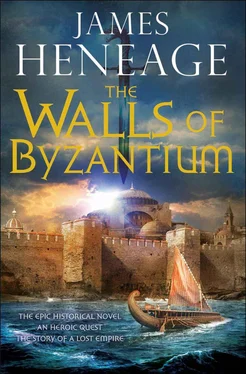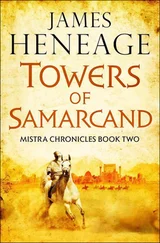James Heneage - The Walls of Byzantium
Здесь есть возможность читать онлайн «James Heneage - The Walls of Byzantium» весь текст электронной книги совершенно бесплатно (целиком полную версию без сокращений). В некоторых случаях можно слушать аудио, скачать через торрент в формате fb2 и присутствует краткое содержание. Жанр: Исторические приключения, на английском языке. Описание произведения, (предисловие) а так же отзывы посетителей доступны на портале библиотеки ЛибКат.
- Название:The Walls of Byzantium
- Автор:
- Жанр:
- Год:неизвестен
- ISBN:нет данных
- Рейтинг книги:3 / 5. Голосов: 1
-
Избранное:Добавить в избранное
- Отзывы:
-
Ваша оценка:
- 60
- 1
- 2
- 3
- 4
- 5
The Walls of Byzantium: краткое содержание, описание и аннотация
Предлагаем к чтению аннотацию, описание, краткое содержание или предисловие (зависит от того, что написал сам автор книги «The Walls of Byzantium»). Если вы не нашли необходимую информацию о книге — напишите в комментариях, мы постараемся отыскать её.
The Walls of Byzantium — читать онлайн бесплатно полную книгу (весь текст) целиком
Ниже представлен текст книги, разбитый по страницам. Система сохранения места последней прочитанной страницы, позволяет с удобством читать онлайн бесплатно книгу «The Walls of Byzantium», без необходимости каждый раз заново искать на чём Вы остановились. Поставьте закладку, и сможете в любой момент перейти на страницу, на которой закончили чтение.
Интервал:
Закладка:
But did the Turks have cannon? Anna’s father, Simon Laskaris, was Protostrator of Mistra, second only in rank to the Despot. He had been urging Theodore for years now to invest in these new machines that used some form of igniting powder to hurl a stone. Indeed, a Hungarian had presented himself at the court only three years past, ready to sell this new technology. But the Despot had merely laughed and waved the man away. He’d rather use the money for new churches.
Anna said, ‘So Bayezid means to conquer the world?’
Her brother nodded. ‘This Sultan is far more warlike than his father. He has boasted that he will water his horse at the altar of St Peter’s in Rome.’
Anna shuddered at the thought of such desecration. Rome might be the seat of a Catholic Pope but he was still a Christian.
Just then a light gust of wind lifted the cooking of a thousand campfires.
‘Come, Anna,’ Alexis said. ‘We’re in God’s hands now. Let’s go inside and see what our mother has for us to eat.’
Anna did sleep that night. So quiet and well disciplined was the Ottoman host that only the neighs of their horses and the sound of mallet on tent peg disturbed the rest of those citizens of Mistra that lay abed.
When dawn came, it was as if a city of tents had risen from the ground in the night. The people of Mistra, emerging sleepily from their bedrooms, wondered at the sight before them. Even the cats were silent.
This was order indeed. For as far as the eye could see there were row upon row of tents, with streets and squares laid out between them and corrals for the horses on the banks of the Evrotas River. At their centre stood a gigantic pavilion, made up of silks of every colour imaginable. It had gardens around it with rows of fruit trees in tubs and caged birds suspended from their branches and neat lawns on either side with borders of tulips gently swaying in the dawn breeze.
Ten minutes later, the Protostrator Simon Laskaris and his daughter were hurrying up the streets on their way to the citadel. The streets were full of jostling crowds anxious for news or simply there to fill amphorae with the water they’d need for the siege. Simon was pleased to see that the praetors, whom he’d ordered be armed the night before, were keeping some sort of order in the queues for the wellheads. The city’s population was already swelled to triple its normal size by the influx of refugees from the countryside.
When she’d heard that her father wanted her to accompany him to meet the Despot, Anna had guessed that he wanted her with him to amuse the Despoena while the men talked. In fact he’d been so impressed by her calm at dinner on the previous evening that he wanted her with him as an example to the city.
And it seemed to be working. People stopped to bow to the Protostrator and stare at the girl striding behind him. They were used to seeing Anna chasing her brother through the streets with a catapult. They knew her as a tomboy, with mud on her knees, the women secretly worrying for the day they knew she would be forced to make some illustrious marriage.
But here she was dressed as a woman.
Anna Laskaris had Norman blood in her veins and it showed in the cascade of hair, soft and red as fox fur, that fell to her waist and in the two malachite eyes that stared out on the world from a face traced with the lightest patina of freckles. Dressed in a chemise of the finest white lawn and with the plaits of her hair braided with flowers, she radiated calm.
They arrived at the citadel to find the Despot already dressed in armour, his breastplate burnished to a perfect sheen. With him was the Despoena Bartolomea, who hurried over to greet them. ‘Anna, you look ravishing! How many soldiers did you distract from their important work on your way up? Come, let’s go and feed my marmoset and you can tell me how things are. That man’ — she nodded in the direction of her husband — ‘tells me nothing.’
The Despot, however, was not to be cheered by the sight of Anna. When the women left, he was still arguing with a Frankish knight over a scroll that lay on the table between them. Eventually, the Despot ripped it in two, handing one half to the knight who bowed stiffly and left.
‘Normans!’ said Theodore. ‘They can’t write and they won’t do anything unless you pay them.’ He looked down. ‘Get up, Simon. I can’t talk to you down there.’
Laskaris rose from his knee.
‘It’s their way of sealing a contract,’ said the Despot, pulling a chair to the table. ‘You put your mark on the paper and then tear it in two. They claim their money when we join the two bits later. Ingenious. Wine?’
The Protostator took the goblet.
‘Sweet wine from Mount Ganos.’ The Despot raised his glass and drained it in a gulp. He wiped his beard and looked suddenly at his friend. ‘Do we still have Mount Ganos, Simon?’ he asked.
‘I fear not, Majesty. Most of Thrace belongs to Bayezid now.’
The Despot sighed. ‘Well at least we’ll still have the Malvasia, assuming those Mamonas pirates haven’t sold the last barrel to the Sultan. Did you know they sell it to the Sultan?’
‘I had heard something,’ murmured the Protostrator, sipping his wine.
‘Horses too, I gather,’ went on the Despot. ‘Since the Turk took Adrianopolis for his capital and renamed it Edirne, they’ve been doing regular business there. The Sultan wants to build up his cavalry and Mamonas has access to Outremer stock. Apparently they’re fast and fierce. Destriers that bite their way into battle.’ He paused. ‘Anyway, we can’t afford them any more than we can cannon. Let’s go outside and see what’s going on.’
The Despot took the arm of his Protostrator and led him from the chamber, up the winding steps and out on to the top of the tower.
The Vale of Sparta stretched out before them in miniature. Simon Laskaris had woken every morning of his forty-eight years to the reassuring sight of that huge plain with its farms, orchards, vineyards, olive groves and the bright ribbon of the Evrotas River winding its way through it all. It was a world of green, ordered prosperity, a world in balance, a world worth fighting for.
Now he saw smoke rising across the plain. Closer to, he saw the tanneries and storehouses alight and tiny Turkish soldiers running to set fire to houses in the Albanian and Jewish quarters.
‘St Demetrius,’ said the Despot suddenly.
‘Majesty?’
‘He’s our patron saint, isn’t he? Have we done enough praying to him, do you think, Simon? Should I organise a procession or something?’
‘Highness, he was also patron saint of Thessaloniki.’
Theodore considered this, stroking his long beard. Thessaloniki, north of the Peloponnese, had fallen five years ago. He looked down at the square in front of the palace below. It was a place he’d wanted to be the new Athens, a place where children would sit at the feet of philosophers and learn of reason. It was a place he loved.
‘The Turks are a very conservative people,’ he said. ‘Their religion leaves very little room for doubt. They won’t keep our square.’
‘No, lord,’ agreed the Protostrator. ‘And the cathedral will become a mosque.’
Both men were silent for a while, each contemplating what this future held for them.
‘Well, no time for conjecture, Simon. What do we do?’
The Protostrator turned back to the plain and pointed at the gigantic pavilion in the centre of the camp. ‘Two Horsehairs, Majesty,’ he said. ‘Which means that someone other than the Sultan is leading this army.’
In the little square of beaten earth outside the entrance to the pavilion stood a single lance driven into the ground. At its top, moving gently in the breeze, were two horse-tails.
Читать дальшеИнтервал:
Закладка:
Похожие книги на «The Walls of Byzantium»
Представляем Вашему вниманию похожие книги на «The Walls of Byzantium» списком для выбора. Мы отобрали схожую по названию и смыслу литературу в надежде предоставить читателям больше вариантов отыскать новые, интересные, ещё непрочитанные произведения.
Обсуждение, отзывы о книге «The Walls of Byzantium» и просто собственные мнения читателей. Оставьте ваши комментарии, напишите, что Вы думаете о произведении, его смысле или главных героях. Укажите что конкретно понравилось, а что нет, и почему Вы так считаете.










